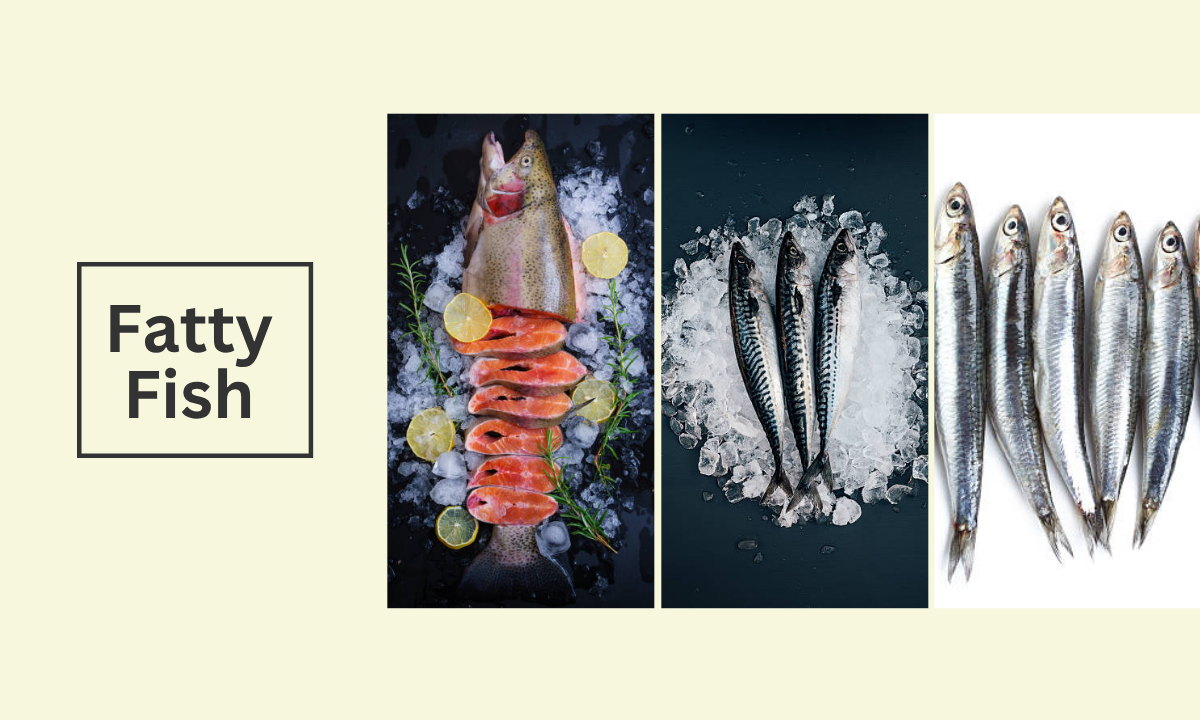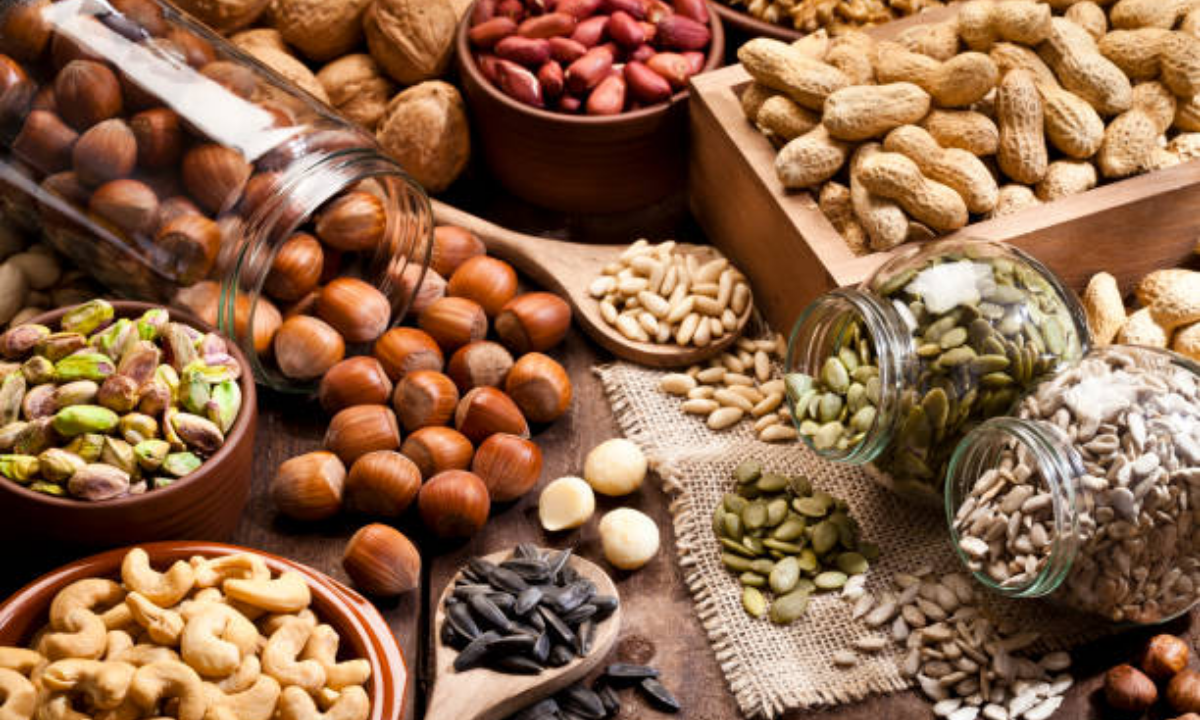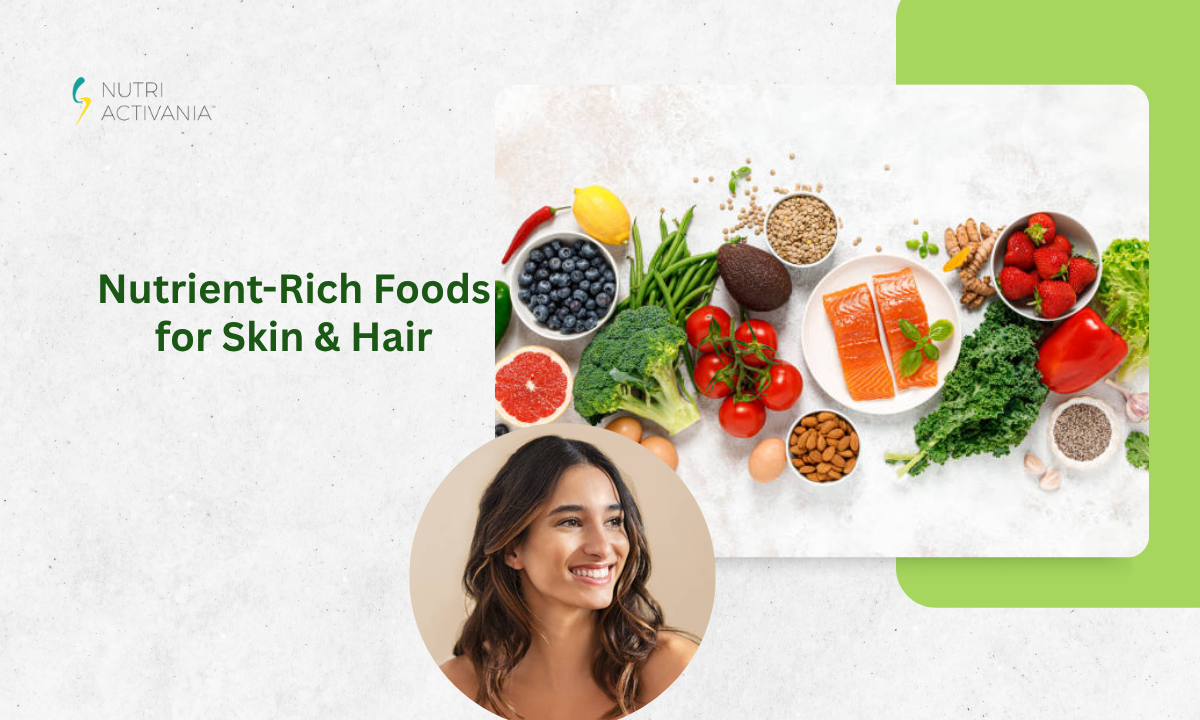As a dietitian at Nutri Activania, I, Avni Kaul, firmly believe that glowing skin and strong hair begin from within. When we talk about foods for skin and hair, we are talking about nourishment, cellular repair, collagen support, pigmentation balance, and long-term resilience.
Today, I will walk you through 15 nutrient-rich foods that support both your skin and hair, explain how they work, and share insights you can act on right away.
1. Fatty Fish (Salmon, Mackerel, Sardines)

Fatty fish are stars in the foods for hair and skin health category. They are loaded with omega-3 fatty acids, protein, selenium, and vitamin D. These nutrients help maintain the skin’s lipid barrier, reduce inflammation, and support hair follicle health.
Moreover, fish, especially with connective tissue or skin, are also collagen-rich foods for skin and hair because they provide the precursors for collagen and elastin synthesis.
2. Eggs
Eggs are a powerhouse in the nutrient-rich foods list. They give you high-quality protein, biotin, zinc, and sulfur, all essential for keratin production (the structural protein in hair and skin).
Because hair is mostly made of proteins, a diet deficient in protein may lead to brittle hair and slower hair growth.
3. Sweet Potatoes (and Orange Vegetables)
Sweet potatoes, carrots, pumpkin, and other orange vegetables are rich in beta-carotene, converted by our body into vitamin A. Vitamin A supports skin repair, cell turnover, and healthy hair follicles.
Beta-carotene also acts as an antioxidant and can help shield skin cells from sun damage.
4. Dark, Leafy Greens (Spinach, Kale, Swiss Chard)
These greens are among the best micronutrient-rich foods. They provide iron, folate, vitamins A and C, and antioxidants.
Vitamin C from these also supports collagen synthesis, which strengthens skin structure and supports hair follicles.
5. Nuts and Seeds (Almonds, Walnuts, Flaxseeds, Chia, Pumpkin Seeds, Sunflower Seeds)

Nuts and seeds are staple nutrient-rich foods that deliver healthy fats, vitamin E, zinc, magnesium, selenium, and more.
They also contribute to melanin-rich foods for hair and skin because nutrients like copper, zinc, and antioxidants help in melanin production and protect pigment cells.
6. Avocado
Avocado is rich in monounsaturated fats (good fats), vitamin E, vitamin C, and carotenoids. These make it a top pick among foods for clear skin and healthy hair.
Additionally, its vitamin C content aids collagen formation.
7. Berries (Strawberries, Blueberries, Raspberries)
These are antioxidant powerhouses. They deliver vitamin C, polyphenols, and compounds that protect skin from oxidative damage.
Vitamin C helps in collagen synthesis, while antioxidants reduce free radical damage to skin and hair follicles.
8. Citrus Fruits (Oranges, Lemons, Grapefruit)
Citrus fruits are excellent sources of vitamin C, which is essential for collagen production.
They also help protect skin and hair from oxidative stress.
9. Bell Peppers & Tomatoes
Bell peppers (especially red/yellow) are loaded with beta-carotene and vitamin C. They support collagen-rich foods for skin and hair by providing building blocks and protection.
Tomatoes contribute lycopene and other carotenoids that help defend skin from UV damage.
10. Broccoli and Cruciferous Vegetables
Broccoli offers vitamins A, C, and K, and also sulforaphane, which can help protect skin from environmental damage.
Cruciferous vegetables support the body’s detoxification processes, which indirectly benefit skin clarity and hair wellness.
11. Shellfish & Oysters
Shellfish, especially oysters, are rich in zinc, a mineral critical for skin repair and hair growth.
Zinc deficiency is linked to hair loss and skin issues.
12. Lean Poultry & Chicken (Especially with Skin / Connective Tissue)
Chicken supports your intake of complete protein and amino acids. If you consume parts with connective tissue, it can contribute to collagen-rich foods for skin and hair.
Protein is foundational for cell regeneration in both skin and hair.
13. Green Tea
While technically a beverage, green tea contains catechins and antioxidants that may protect hair follicles and skin cells.
It’s considered among the beneficial micronutrient-rich foods list in the sense of delivering bioactive compounds beyond calories.
14. Dark Chocolate (High Cocoa Content, >70%)
Dark chocolate contains flavonols and polyphenols that can improve blood flow, reduce oxidative stress, and support skin elasticity.
In moderation, it can be part of your foods for clear skin and healthy hair strategy.
15. Water-Rich Foods & Hydrating Vegetables (Cucumbers, Watermelon, Tomatoes, Celery)
Hydration is often overlooked in foods for skin and hair. Foods with high water content support the moisture balance in the skin and scalp.
Proper hydration enhances nutrient delivery and detoxification, which in turn supports skin radiance and hair resilience.
How These Foods Work Together (Beyond the List)
- Protein + Amino Acids form the building blocks for keratin (hair) and collagen/elastin (skin).
- Vitamins & minerals like vitamin C, A, E, zinc, copper, selenium, and B vitamins support repair, pigmentation, antioxidant defense, and healthy pigmentation (melanin).
- Healthy fats help maintain the skin barrier and support scalp health.
- Antioxidants / Polyphenols fight oxidative stress that accelerates ageing and hair follicle damage.
- Hydration & detox support improve circulation, toxin clearance, and nutrient transport.
Because hair and skin tissues turn over frequently, consistent intake of these nutrient-rich foods matters more than short bursts.
Wrapping Up
As a dietitian at Nutri Activania, I, Avni Kaul, have seen how the right food choices can transform skin glow, hair strength, and long-term dermatological health. The foods for skin and hair direct you toward nourishment, but the real impact comes when it becomes your daily habit.
By consistently including these nutrient-rich foods, you build a terrain inside your body that supports collagen formation, melanin balance, antioxidant defense, protein synthesis, and hydration. Over time, your skin feels firmer, your hair looks shinier, and both resist stress, ageing, and environmental damage.
That said, food is powerful but not magical. External care, good sleep, stress management, hormonal balance, and sun protection all play key roles. At Nutri Activania, I emphasize a holistic approach: nutrition, lifestyle and dermatologic care working together.
Now, let’s answer some of the common questions I hear from clients:
FAQs
Q: Can I get all these nutrients from supplements instead of food?
I always encourage food first—whole foods offer synergy and fiber. Supplements can help when deficiencies are proven via diagnostics, but they shouldn’t replace a well-rounded diet.
Q: Is collagen supplementation better than eating collagen-rich foods?
Supplements may help in some cases, but many collagen peptides just supply amino acids. Eating collagen-rich foods (like fish, bone broth, and poultry) plus nutrients that support collagen synthesis (vitamin C, zinc) is often more sustainable.
Q: How long before I see changes in skin or hair when I switch diet?
Hair and skin have cycles. You may notice subtle improvements (glow, reduced dryness) within 4–6 weeks; stronger, thicker hair may take a few months. Consistency is key.
Q: What about genetic issues, grey hair, or severe hair loss?
Nutrition helps support general health and resilience, but genetic or hormonal issues (e.g., alopecia, thyroid disorders) also require medical evaluation. Diet is one piece of the puzzle.
Q: Can people in Delhi (or India) get access to these foods easily?
Yes. Many of the 15 foods listed (eggs, leafy greens, nuts, citrus fruits, sweet potatoes, poultry, and fish) are locally available. As a nutritionist in Delhi, I design plans that use regional and seasonal foods to meet these nutrient goals.


